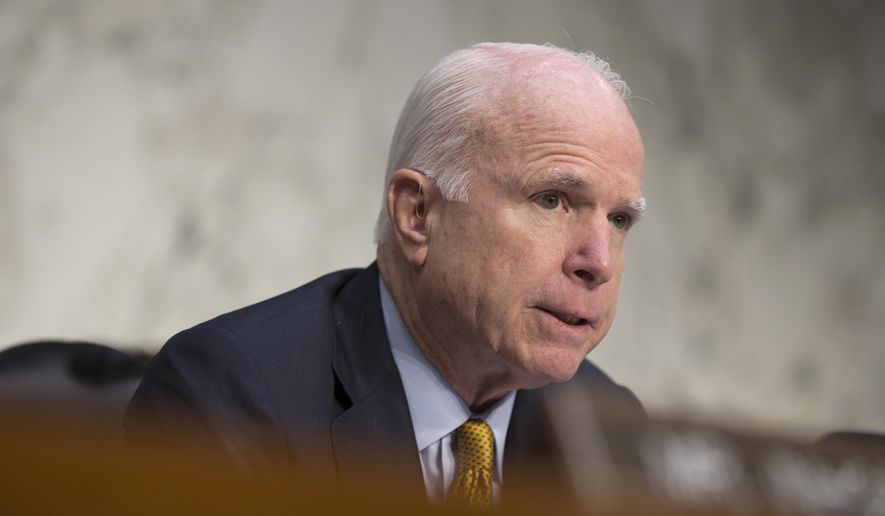The head of the Senate Armed Services Committee says the U.S. is not doing enough to help relocate from Iraq members of controversial Iranian dissident group that has a record of providing Washington with “useful intelligence” on Iran’s clandestine nuclear activities.
During a committee hearing Wednesday, Sen. John McCain said successive U.S. administrations have broken their promise to protect members of the People’s Mujahedin of Iran — known in U.S. national security circles as Mujahedin-e-Khalq, or “MEK.”
The group has been left particularly in the lurch since the Obama administration pulled U.S. troops from the Iraq in 2011, said Mr. McCain, who accused Iranian government-backed militias of carrying out atrocities against the dissidents at a facility near Baghdad known as “Camp Liberty” — where they are being kept in semi-captivity by Iraqi authorities.
Initially, the dissidents were protected by U.S. forces, who occupied Iraq from 2003.
“The U.S. government and military made a commitment to protect thousands of people [in the group] who surrendered their weapons and came under our protection as a result,” Mr. McCain said. “Clearly, this commitment has not been sustained.”
“This is not just a matter of our ideals, but also our interests,” the Arizona Republican said. “The group to which the residents of Camp Liberty belong has provided some very useful intelligence on Iran’s nuclear program, specifically revealing the existence of covert Iranian nuclear activities.”
The stakes of protecting the MEK have increased in light of the recent pushing through by the Obama administration of a major international nuclear deal with Tehran, Mr. McCain added, because “we need the best information on whether Iran is meeting its commitments” under the accord.
He made the assertion during a hearing focused on the Iranian government’s growing influence in Iraq and how it will impact Washington’s long and tumultuous relationship with the so-called “MEK” — some 2,800 members of which are said to be residing at Camp Liberty.
While other U.S. lawmakers and intelligence officials have long praised the MEK for providing insights into Iran’s clandestine nuclear operations, the group’s controversial past and militancy found it listed as a terrorist organization for years in Washington.
The MEK, which engaged in a power struggle against leaders of Iran’s 1979 Islamic Revolution, was known to have carried out terrorist attacks against Iranian government targets during the 1980s. Although U.S. officials say it also participated in attacks on Americans, MEK representatives have long argued that the U.S. terrorist listing was never driven by any legitimate national security concerns.
The group’s representatives in Washington say that during the late 1990s, officials within the Clinton administration engaged in a calculated smear campaign against the MEK and ultimately listed the group as a terrorist organization as part of an ill-conceived strategic attempt to improve relations at the time between Washington and Tehran.
The Obama administration officially removed the group from terror lists in 2012.
But the group still has detractors among many current and former U.S. officials and the overall MEK issue remains heated whenever it comes up on Capitol Hill.
Rep. Ted Poe, Texas Republican, prompted outrage among MEK detractors last April when he invited the group’s leader, Maryam Rajavi, to testify before the House Committee on Foreign Affairs’ subcommittee on terrorism.
The hearing, focused on the Islamic State threat in Iraq and Syria, was supposed to also feature testimony from Robert Ford, the former U.S. ambassador to Syria, as well as Daniel Benjamin, the Obama administration’s former counterterrorism coordinator.
But both men refused to appear with Mrs. Ravaji on grounds that they did not want to give lend legitimacy to the MEK.
“What the [expletive] do the MEK know about the Islamic State,” Mr. Ford said at the time, according to Al-Monitor, which also quoted Mr. Benjamin as saying, “no one can seriously dispute that the MEK has plenty of American blood on its hands.”
Al-Monitor reported that it had also been told in an email by Mr. Benjamin that, “In addition to killing U.S. civilians and military personnel, participating in the 1979 takeover of the U.S. Embassy in Tehran and serving as a strike force for Saddam Hussein, the group treats its own member abysmally and coercively.”
Former U.S. officials who testified before the Senate Armed Services Committee on Wednesday rejected such claims.
Retired U.S. Marine Corps Gen. James L. Jones, who served as President Obama’s national security adviser in 2009 and 2010, said Washington should treat the MEK members in Iraq as “refugees.”
The Obama administration, he said, has been “slow, ineffective and even reluctant in responding to our humanitarian obligation to facilitate” their relocation out of Iraq.
Former U.S. Sen. Joe Lieberman of Connecticut also testified, lamenting that U.S. officials have “broken their promise” to protect the group.
• Guy Taylor can be reached at gtaylor@washingtontimes.com.




Please read our comment policy before commenting.